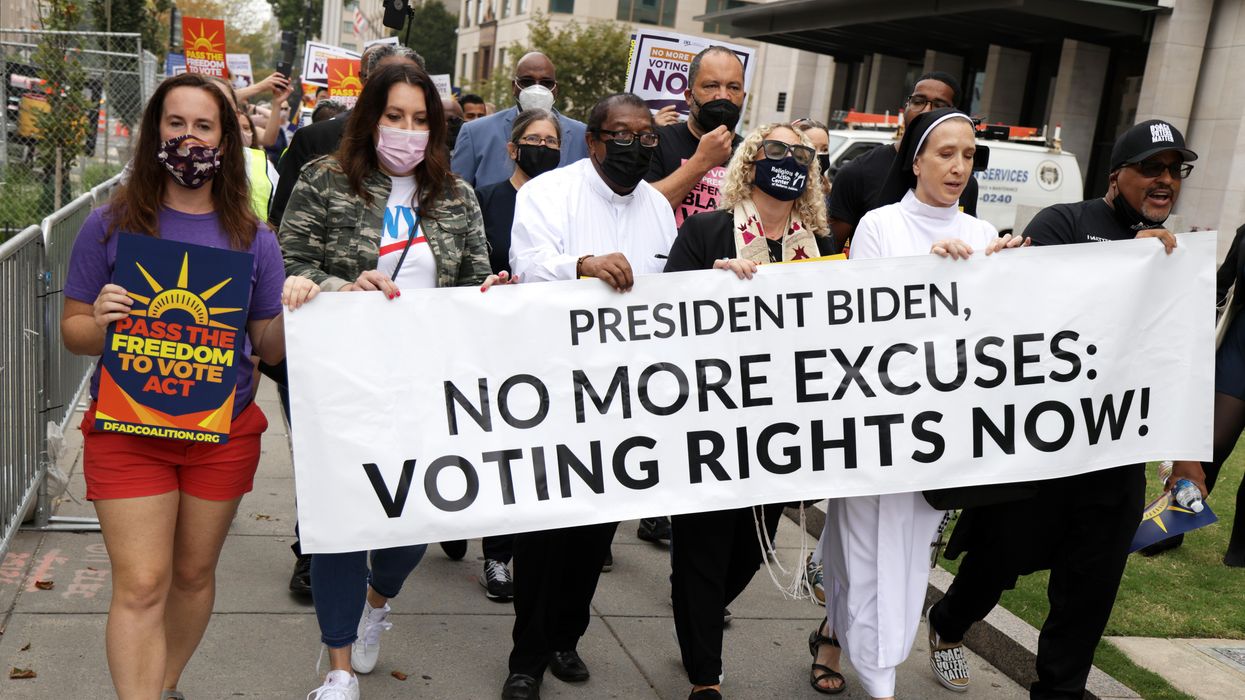Baumel is a policy analyst with The New Center.
America is in the midst of a war over voting with no end in sight. But the fight is about a lot more than former President Donald Trump's false charges about the 2020 election.
With COVID-19 came extraordinary changes to how we registered, how we voted, how the votes were counted, and which officials held the power to set election procedures and litigate election disputes. Should these measures be considered the new normal moving forward? Should we revert back to the pre-pandemic status quo? Or should we opt for something in between?
These are the questions that really need to be answered to finally bring peace to our voting war.
It won't be easy because voters are inhabiting two separate realities when it comes to their views on voting. A recent Quinnipiac poll asked voters to identify their biggest concerns about voting and found 82 percent of Republicans most concerned about voter fraud and 84 percent of Democrats most concerned about voter suppression.
Right now, everyone thinks the worst of partisans on the other side, which means facts or the particulars of voting reform proposals don't matter. What matters most is the widespread belief on each side that the other side has ulterior motives for what they are doing.
Can you blame people for feeling this way?
Right now, Republican-led state legislatures across America are pushing voting and election reform measures with zero support from Democrats. Meanwhile, Democrats in Congress have been pushing their own voting reforms — like the federal For the People Act — without any Republican support.
Anyone interested in ending these hyperpartisan voting wars — whether at the state level or in Washington—should start by looking to the following five solutions.
1. Keep it simple.
According to MIT's Survey of Performance of American Elections, a voter will trust the system if it's easy to find the polling place, the line is short, the equipment works, and the ballot instructions are clear — even if the voter's preferred candidate doesn't win. Adding polling places in densely populated areas, keeping equipment updated, avoiding complicated voting procedures, and erring on the side of overcommunication with voters prior to an election are all easy ways to enhance trust.
States should also put in deadlines — at least three to six months out from an election — for when election procedures can be changed to prevent confusion among voters about the implications of late-breaking voting rules.
2. Results by midnight on election night whenever possible.
Delays in reporting election results create a vacuum that gets filled by conspiracy theories. That's why legislatures and voting officials should do everything they can to declare winners on election night — and by the morning after the election at the latest. Of course, this might not be possible in particularly close races, but there are plenty of common-sense measures, such as absentee ballot pre-canvassing, that can make the count quicker.
3. Don't make early voting too early.
Early voting is an important way to promote voter access and convenience. But while a presidential campaign is a marathon, the last few weeks leading up to Election Day are a sprint, packed with ads, debates and campaign stops as each candidate makes their final push to persuade and turn out voters.
However, in some states, people are voting before the campaign sprint even starts, with early voting periods beginning up to 46 days before Election Day. States should aim to strike a balance by allowing for an early voting period that begins no more than two weeks prior to the election.
4. Make it easier to vote in person.
Absentee and mail ballots have historically been safe and secure ways for people to vote, and there's nothing wrong with states making this option easily accessible, provided they have the proper safeguards to verify identity and prevent abuses like ballot harvesting. But Americans also tend to trust in-person voting more, and that's an important fact in this new age of mistrust. That's why Congress should make Election Day a national holiday to make it easier to get to the polls.
5. Mandate voter ID ... and make it easier to get one.
A June 2021 poll from Monmouth University found that 80 percent of Americans support photo ID requirements and only 18 percent oppose them.
But here's the problem: Some states only accept government-issued photo IDs and some voters — the elderly, low-income people, people of color, or those living in rural areas — might face extra difficulty when it comes to traveling or paying the fees necessary to get such an ID.
States can promote access and integrity by making voter ID laws universal, but also making it much easier for people to meet ID requirements. This can involve accepting a wider range of photo IDs or simplifying the process of obtaining a government-issued photo ID.



















